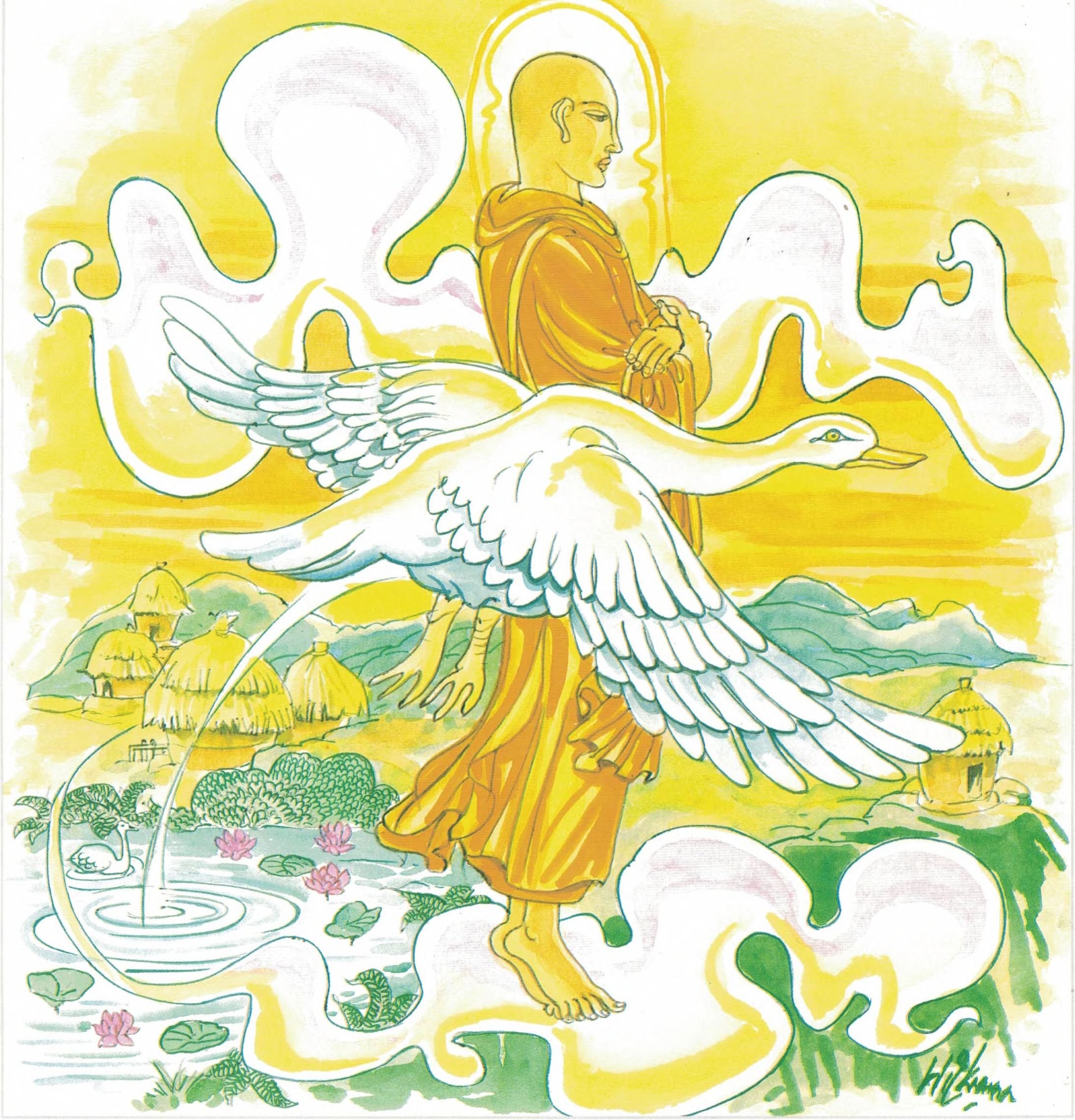Dhammapada (Illustrated)
by Ven. Weagoda Sarada Maha Thero | 1993 | 341,201 words | ISBN-10: 9810049382 | ISBN-13: 9789810049386
This page describes The Story of Venerable Mahakassapa which is verse 91 of the English translation of the Dhammapada which forms a part of the Sutta Pitaka of the Buddhist canon of literature. Presenting the fundamental basics of the Buddhist way of life, the Dhammapada is a collection of 423 stanzas. This verse 91 is part of the Arahanta Vagga (The Saints) and the moral of the story is “Mindfully delighting in no abode, they move from home to homeless like departing swans”.
Verse 91 - The Story of Venerable Mahākassapa
Pali text, illustration and English translation of Dhammapada verse 91:
uyyuñjanti satimanto na nikete ramanti te |
haṃsā'va pallalaṃ hitvā okamoka jahanti te || 91 ||
91. Mindful Ones exert themselves, in no abode do they delight, as swans abandoning their lake home after home they leave behind.
 Mindfully delighting in no abode, they move from home to homeless like departing swans. |
The Story of Venerable Mahākassapa
While residing at the Veluvana Monastery, the Buddha spoke this verse, with reference to Venerable Mahākassapa.
On a certain occasion, after keeping residence during the season of the rains at Rājagaha, the Buddha made this announcement to the monks, “At the end of a fortnight I will go forth on a pilgrimage for alms.” But while the monks were scalding their bowls and dyeing their robes, the Venerable Mahākassapa washed his robes. The monks were offended at this and said, ‘Why does the Venerable wash his robes? Within and without this city dwell a hundred and eighty million people. So many of these as are not the Venerable’s kinsfolk are his supporters; and so many as are not his supporters are his kinsfolk. All these people show honour and reverence to the Venerable by providing him with the four requisites. If he rejects all their good offices, where will he go? Even were he to go, he would not go farther than Māpamāda Cave.” (Māpamāda Cave, by the way, acquired its name in the following way: Whenever the Buddha reached this cave, he would say to the monks who were to return, “Now you may return;be not heedless–mā pamajjittha.” Thus this cave came to be called Māpamāda Cave.)
Likewise the Buddha thought, as he set out on his pilgrimage, “Within and without this city dwell a hundred and eighty million people, and on occasions of public festivals or disasters, there the monks must go. It is therefore out of the question to leave the monastery empty. But shall I direct all of them to return?” Then the following thought occurred to him, “These people are either kinsfolk or retainers of Mahākassapa; therefore, it is Mahākassapa whom I should direct to return.” Accordingly he said to the Venerable, “Mahākassapa, it is out of the question to leave the monastery empty, for there is need of monks on occasions of public festivals or disasters; therefore take your own retinue with you and return.” “Very well, Venerable,” replied the Venerable and taking his own retinue with him, he returned.
The monks were offended at this and said, “Did you observe, brethren? Did we not just say, ‘Why is Mahākassapa washing his robes? He will not accompany the Buddha.’ Everything has happened just as we said it would.” When the Buddha heard the talk of the monks, he turned around, stood still, and said, “Monks, what is this you are saying?’ “We are talking about Venerable Mahākassapa, Venerable,” replied the monks, and then repeated their conversation word for word. The Buddha listened to what they had to say and then replied, “Monks, you say, ‘Mahākassapa is attached to his households and his requisites.’ As a matter of fact, he turned back because it was his desire to obey my command. For in a previous state of existence he made an earnest wish and became, like the moon, free from attachment. He made the earnest wish, ‘May I be able to approach the households of supporters.’ Mahākassapa has no attachment for a household or a requisite. Beginning with Mahākassapa, I preached to all a path like that of the moon, the path of the stock of the elect. My son has no attachment anywhere, but is like a royal goose which goes down into a lake and swims and remains there.
Explanatory Translation (Verse 91)
satīmanto uyyuñjanti te nikete na ramanti
te pallalaṃ hitvā haṃsā iva okamokaṃ jahanti
satīmanto [jahanti satīmanta]: those mindful ones; uyyuñjanti: constantly practice; te: they; nikete: in attachment; na ramanti: do not take interest in; te pallalaṃ hitvā iva: like leaving the lake; haṃsā: swans; okamokaṃ [okamoka]: all settled abodes; jahanti: leave (give up)
Those mindful ones make the effort to keep their attentiveness always in trim. They are not at all attached to abodes or settlements. Giving up all places of settled living, they leave like the swans who fly away free in mind.
Commentary and exegetical material (Verse 91)
satīmanto: those who are attentive. Sati is attention, perpetual alertness. Attentiveness, which is introspective attention, is one of the five spiritual Faculties and Powers, one of the seven factors of enlightenment, and the seventh link of the eight-fold path, and is, in its widest sense, one of those mental factors inseparably associated with all kammically wholesome and kamma-produced lofty states of mind.
arahants: Arahants wander whithersoever they like without any attachment to any particular place as they are free from the conception of ‘I’ and ‘mine’.
